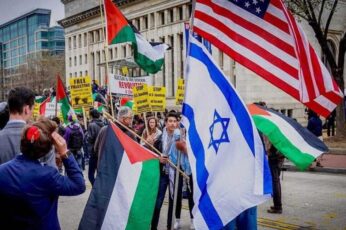All views and opinions expressed in this article are those of the author, and do not represent the Roar as a whole.
Hundreds of Jewish students walk the campuses of Columbia University, MIT, and Emerson, on edge and afraid to simply exist as themselves. Stars of David are tucked under shirts, heads are kept down, and anxiety runs rampant.
As of 2023, there are 15.7 million Jews in the world with only 7 million of them being Israeli. That’s less than 0.2% of the population. Meaning only a very small percentage of the Jewish population have any affiliation to Israel at all due to the diaspora.
Starting at the end of March and through the month of April, there has been a rising increase of students protesting against Israel and the invasion of Gaza on college campuses. These Pro-Palestinian protests have begun much controversy after more and more students began to express violence and anger. These demonstrators have been outwardly described as peaceful from many participants on apps like X and Instagram, but students at these universities have claimed to be victims of these protests and they demand justice.
Instagram accounts @jewishoncampus and @joccolumbia reported that as of Wednesday, April 17, 2024 Jewish students at Columbia have avoided dining halls, libraries, and classrooms due to feeling unsafe expressing their religion on campus. Since then, the problem has only gotten worse.
Jacob Schmeltz, a senior and VP of the Jews On Campus Student Union at Columbia University has expressed that he feels safer off campus than he does on campus due to the distressing violence that has risen at his school.
“Is the threat so real and so present that you had to leave?” asked Chris Jansing in a virtual interview with Schmeltz on NBC News to which the senior responded with “Yes, absolutely. I feel so physically and emotionally unsafe that I decided I have to go home.”
Schmeltz goes on to explain that currently, during the sacred Jewish holiday of Passover, many of his peers share the same concerns. “[Lots of] students like myself feel that we cannot celebrate this holiday on campus,”
According to Schmeltz, a call for a peaceful resolution feels out of the question now for so many Jewish college students when, for the past several weeks, they have heard distressing statements such as “we are Hamas” and “burn Tel Aviv to the ground”.
“Jewish students are being confronted and harassed simply for being physically identifiable as Jewish,” said Schmeltz
But this issue hasn’t just been at Columbia. Both MIT and Emerson students have created camps to demonstrate their peaceful protests in support of Palestine. But can the protests really be described as “peaceful” when so many have expressed concerns for their wellbeing as a result?
Lousia Moller at WBZ News reported on a student from Emerson College, Margaux Jubin, who was trying to make her way through in order to shoot for her school’s newspaper.
“[Someone told me] ‘no zionists are allowed in this part of the alley,’” said Jubin.
Of course, the ability to protest is an American right, so what makes a protest hateful? Where is the line drawn between speaking out and speaking against?
In an article in the New York Post written by Robert Kraft, founder of Columbia’s Kraft Center of Jewish Life, he explicitly addresses the horrors that these protests have turned into at the school that was once a very important piece of his life. “I no longer recognize my alma mater.”
Kraft reports that chants such as “go back to Poland” and “kill all Jews” are common phrases heard now, this behavior is something Kraft will not tolerate. “This hateful rhetoric calling for death and destruction of an entire population has no place at Columbia and no place anywhere,” said Kraft.
According to the Anti-Defamation League, encampments have been set up at over 50 American college campuses in recent weeks. The ADL has also reported that a concerning majority of these protests have included support for the Hamas terrorist organization and anti semitic backlash.
Oklahoma State University politics professor Seth Mckee has said he is unsure that these protests have accomplished anything besides unsafe disruption. Explaining that he sees them as “jumbled and misguided and misdirected.” Mckee believes that a small percentage are productive at making the understandable call for the American foreign policy to apply pressure on Israel to pull out of Gaza. But the general expectation for American officials to force an end to the war is simply unrealistic.
Mckee goes on to say that he doesn’t think protesters will be pleased with the political alternative to Biden’s approach to this war since former president Donald Trump has even tighter ties to Israel’s prime minister, Benjamin Natanyahu. “So what are you trying to accomplish when your alternative politically in an election cycle is worse than what you have?”
Political activists for both sides of this war have grown too comfortable with their hatred and too bold with their speech. Victims of violence and hate deserve the justice they demand as this should never be tolerated, no matter who it’s against. Those responsible for instilling fear into innocents and spreading hatred for Jews should be held accountable for their actions. Further action should be taken in protection of those affected and education on topics as serious as these should be made more accessible.
“Those who cannot remember the past are condemned to repeat it.” – George Santyana 1905


